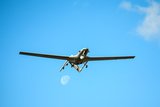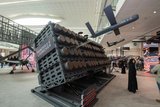Lockheed Martin follows Raytheon in strategic teaming on rocket motors as demand increases
The missiles that decide the outcome of conflicts are powered by rocket motors. The more active the conflict, the more rocket motors are needed. (Photo: Lockheed Martin)
Lockheed Martin and General Dynamics have signed a strategic teaming agreement for the production of solid rocket motors. The move is aimed at securing a domestic supply chain for the motors that, for instance, fire missiles at their targets.
Such strategic collaborations look to be an emerging defence trend in 2024, following Raytheon’s signing of a deal with Avio in July for the same fundamental purposes. Raytheon justified the collaboration with the logic that more of its rocket motors were being used than had been usual in Ukraine, powering its Advanced Medium-Range Air-to-Air Missile (AMRAAM) and AIM-9X AAM missiles, as the resistance to the Russian invasion continued.
The rationale from Lockheed Martin is similar.
Related Articles
Defence business booms and order books build on the back of Russia–Ukraine war
Israel cleared for $20 billion in arms packages
“This agreement enables Lockheed Martin and General Dynamics to ramp production of in-demand solutions more quickly going forward,” said Tim Cahill, president of Lockheed Martin Missiles and Fire Control. “Maintaining a robust and diverse supply chain for solid rocket motors is critical to advancing our vision for a stronger, more resilient defence industrial base.”
The work of the collaborating companies will initially focus on the production of rocket motors for the Guided Multiple Launch Rocket System (GMLRS) at the General Dynamics facility in Camden, Arkansas, beginning in 2025. Lockheed Martin said the initial collaboration would be followed by a phased planning approach to transition to other products.
Related Programmes in Defence Insight
More from Air Warfare
-
![Bayraktar TB2: The $4.11 billion market success of a cost-effective MALE UAV]()
Bayraktar TB2: The $4.11 billion market success of a cost-effective MALE UAV
The success of the Bayraktar TB2 stems from it fulfilling a niche of providing reasonable capabilities at a low cost, leading to its acquisition by more than 30 countries including many in Africa; but there are reasons to be cautious about its potential future prospects.
-
![Singapore Airshow 2026: APAC countries explore fleet upgrade and expansion opportunities]()
Singapore Airshow 2026: APAC countries explore fleet upgrade and expansion opportunities
Ahead of the Singapore Airshow 2026, opportunities for defence firms to upgrade or replace ageing aircraft remain strong, with tactical transport, combat aircraft and maritime patrol aircraft at the top of potential procurement lists.
-
![Anduril awarded latest OPF-L contract with around $155.2 million still up for grabs]()
Anduril awarded latest OPF-L contract with around $155.2 million still up for grabs
As the US Marine Corps continues to push loitering munitions as a core battlefield tool, Shephard looks at how the latest contract award factors into future potential purchases.
-
![GA-ASI makes strides with further MQ-20 intercept test success]()
GA-ASI makes strides with further MQ-20 intercept test success
The latest test of advanced autonomy development focused on human-machine teaming, loading a mission profile onto the platform.
-
![Edge and Indra to form manufacturing entity to meet European loitering munition demand]()
Edge and Indra to form manufacturing entity to meet European loitering munition demand
Once approved by shareholders, the newly established manufacturing company will be developed in Spain and will look to address the burgeoning demand for loitering munitions from Spain and the rest of Europe.






















